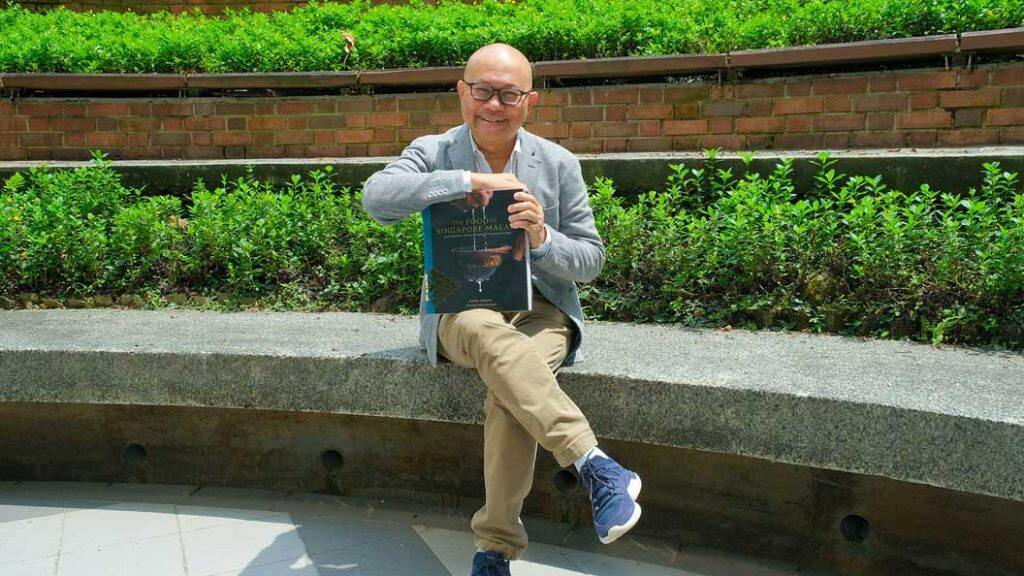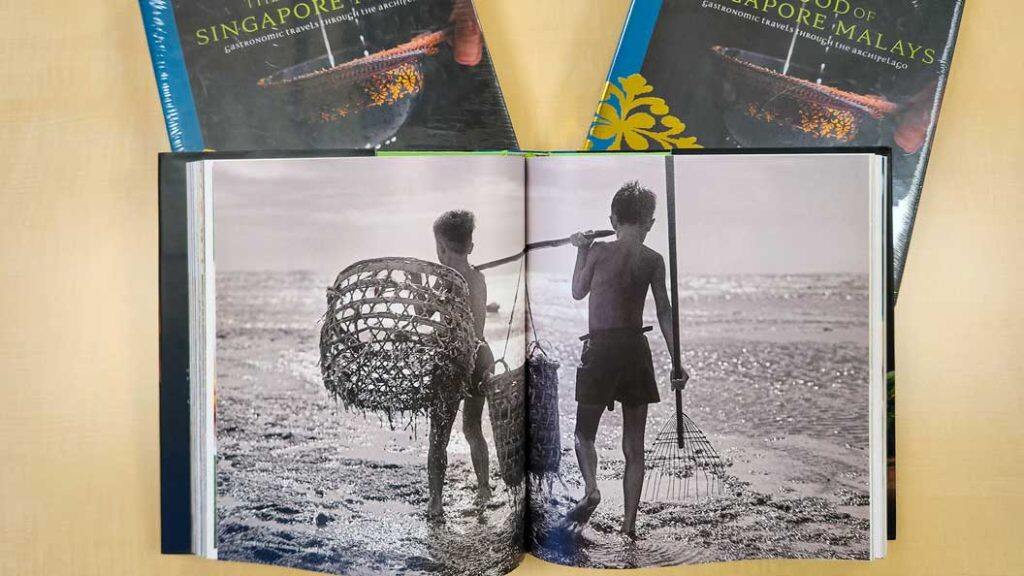The groundbreaking book offers new insights into the cultural history and heritage of Singapore Malays through Malay cuisine.


Educator and food historian Mr Khir Johari, whose work, The Food of Singapore Malays: Gastronomic Travels through the Archipelago (Singapore: Marshall Cavendish, 2021) profoundly reshapes our understanding of the gastronomy and cultural history of Singapore Malays, has been awarded the 2024 NUS Singapore History Prize. Mr Khir Johari will receive a cash award of S$50,000.
Created in 2014 in support of the national SG50 programme to celebrate the 50th anniversary of Singapore’s independence, the NUS Singapore History Prize is awarded to an outstanding publication that has made a lasting impact on our understanding of the history of Singapore, and that is accessible to a wide audience of specialist and non-specialist readers.
A five-member Jury Panel chaired by Mr Kishore Mahbubani, Distinguished Fellow at the NUS Asia Research Institute, selected the winning work from a short list of six works, itself culled from a total of 26 submitted works authored by local and international scholars. The other Jury Panel members are: Emeritus Professor John N. Miksic of the NUS Department of Southeast Asian Studies; Professor Tan Tai Yong, President of the Singapore University of Social Sciences; Professor Peter A. Coclanis, Director, Global Research Institute, the University of North Carolina, Chapel Hill; and economist Dr Lam San Ling.
The five books that were shortlisted alongside the winning publication are:
- Wesley Leon Aroozoo, The Punkhawala and the Prostitute (Singapore: Epigram Books, 2021).
- Timothy P. Barnard, ed., Singaporean Creatures: Histories of Humans and Other Animals in the Garden City (Singapore: NUS Press, 2024).
- Kevin Blackburn, The Comfort Women of Singapore in History and Memory (Singapore: NUS Press, 2022).
- Loh Kah Seng, Alex Tan Tiong Hee, Koh Keng We, Tan Teng Phee, and Juria Toramae, Theatres of Memory: Industrial Heritage of 20th Century Singapore (Singapore: Pagesetters Services, 2021).
- Lynn Wong Yuqing and Lee Kok Leong, Reviving Qixi: Singapore’s Forgotten Seven Sisters Festival (Singapore: Renforest Publishing, 2022).
Of the five books, the Jury Panel also highlighted two that deserve special commendation and recognition. They are, ranked in order of priority, Reviving Qixi: Singapore’s Forgotten Seven Sisters Festival by Lynn Wong Yuqing and Lee Kok Leong; and Theatres of Memory: Industrial Heritage of 20th Century Singapore by Loh Kah Seng, Alex Tan Tiong Hee, Koh Keng We, Tan Teng Phee, and Juria Toramae. The Jury Panel found the two books compelling and riveting: one offers new insights into a forgotten festival celebrated by the Chinese community in Singapore while the other delves into the understudied labour and industrial history of Singapore.
Mr Mahbubani, Chair of the NUS Singapore History Prize Jury Panel, said: “Southeast Asia is a magical place. At a time when many regions are suffering conflict, tension and stagnation, Southeast Asia remains an oasis of peace and prosperity, despite its incredible diversity. Why? The deeper and longer history of the region may explain this. Khir Johari’s book is a deserving winner of the Singapore History Prize because it sheds new light on our history. Few Singaporeans know that over a hundred years ago, Singapore had already emerged as ‘the New York of the Nusantara.’ This book will open their eyes to Singapore’s long and rich involvement with its surrounding region. And it is a truly beautifully produced book that will enchant its readers.”


The Food of Singapore Malays: Gastronomic Travels through the Archipelago
The Food of Singapore Malays: Gastronomic Travels through the Archipelago is an unwritten story of a people. Between the vast Indian and Pacific oceans lies the Malay Archipelago, known widely as the Nusantara, which has nourished the lives of indigenous Malays throughout the centuries and nurtured the diverse peoples that have set foot on their shores. Today, the Malays make up less than a fifth of the population in Singapore, a city with ancient ties to the Malay world.
This book explores their food, not just as a means of sustenance but as a cultural activity. Inheriting the Nusantara’s rich flavours, Singapore Malays have a grand culinary heritage reflecting their worldviews, social values and historical interactions with other cultures. Through close examination of their daily objects, customs, art and literature, these pages reveal how the food Malays enjoy is deeply embedded in different aspects of their identity.
Following the broad sweep of Malay cuisine’s evolution – from the 7th-century kingdom of Srivijaya to the 21st-century emporium of cosmopolitan Singapore – this book traces the continuity and dynamism of a shared cultural consciousness. Sumptuously served with stunning photographs, delicious recipes and diligent research, this is essential reading for anyone – gourmets and amateurs alike – hungry for a deeper understanding of the relationship between people and their food.
Please refer to the Annex for the citation on the winning work by Khir Johari, along with the two books receiving special commendations.
About Khir Johari
Khir Johari is the author of the award-winning book, The Food of the Singapore Malays: Gastronomic Travels Through the Archipelago. which has received widespread acclaim, including Singapore’s Book of the Year 2022, Gourmand World Food Culture Award’s Best of the Best Book 2023, and its prestigious Best of the Last 25 Years. Following this success, Khir founded “Dialogues by Khir Johari,” a platform dedicated to exploring Nusantara’s gastronomy through events and online discussions. Its inaugural event was a symposium titled Serumpun: Tasting Tradition, Telling Tales.
Aside from his literary achievements, Khir is an avid art collector and independent researcher specialising in the history and heritage of maritime Southeast Asia. He holds a Bachelor of Science degree in Mathematics from Santa Clara University and a Masters in Education from Stanford University. He serves as a board member of the Asian Civilisations Museum Singapore.
Born and raised in Kampong Gelam, Khir was immersed in the diverse Nusantara culinary traditions from a young age, learning from both his family and the larger vibrant communities of this historic district.
Khir Johari remarked: “I am touched and humbled by this recognition. It is an honour to receive this NUS Singapore History Prize among such a distinguished list of writers. My hope is that we continue the important work of preserving and celebrating our rich culinary heritage. Our shared cultural roots are an essential starting point for understanding how food connects us across generations and borders.”
“When I set out on this book project 14 years ago, my aim was to document our nation’s first cuisine. What started as a chronicle of food culture evolved into a celebration of our custodians of gastronomic knowledge and wisdom. This book is a tribute to the fishermen, farmers, hawkers, smiths who produced our kitchen accoutrements, as well as cookbook writers, cookery teachers, homemakers and more.”
“My wish for this book is that it answers the question of why we eat what we eat as a people. I also hope it serves as a reminder that Singapore has always been an important node in a larger interconnected network. Indeed, Singapore can be aptly regarded as the New York of the Nusantara for its role and contributions in shipping, trade, publishing and performing arts of the region.”
The NUS Singapore History Prize
Mooted by Mr Mahbubani, the NUS Singapore History Prize aims to stimulate an engagement with Singapore’s history broadly understood (this might include pre-1819) and works dealing with Singapore’s place in the world. Another purpose is to make the complexities and nuances of Singapore’s history more accessible to non-academic audiences and to cast a wide net for consideration of works that deal with history. At the same time, the Prize hopes to generate a greater understanding among Singaporean citizens of their own unique history.
The Prize is an open global competition and is administered by the Department of History at the NUS Faculty of Arts and Social Sciences. The 2024 Prize was open to works in English (written or translated) published between 1 June 2021 and 31 May 2024. Non-fiction and fiction works were eligible for the Prize. Other creative works that have clear historical themes could also be submitted. Book-length works that were either authored or co-authored, and addressed any time period, theme, or field of Singaporean history, or include a substantial aspect of Singaporean history as part of a wider story were eligible.
The Prize is awarded every three years, and the author of the winning publication will receive a cash award of S$50,000. The inaugural Prize was awarded in 2018 to Professor John Miksic, whose work Singapore and the Silk Road of the Sea, 1300–1800 provides detailed archaeological evidence that Singapore’s story began more than 700 years ago. In 2021, the Prize was awarded to Hidayah Amin for her book Leluhur: Singapore’s Kampong Gelam which presents the history of Kampong Gelam in the context of changes to Singapore’s economic, political, and social history over the last 200 years.
Enquires about the next round of the NUS Singapore History Prize, which will open for nominations in due course, and be awarded in 2027, should be addressed to hisprize@nus.edu.sg.








































